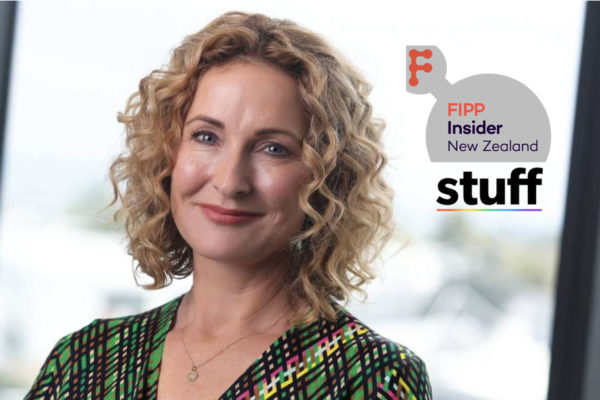Stuff’s Sinead Boucher on turning the newsroom from cuts to growth
The FIPP Insider New Zealand event took place today, organised in conjunction with the Magazine Publishers Association of New Zealand (MPA) and FIPP strategic partner PressReader. A year on from her purchase of the publication, Stuff CEO Sinead Boucher reflected back on a year of change carried out during the global pandemic, and cites the turning point from newsroom cuts to growth as one of the company’s greatest successes.
It’s been a rollercoaster 18 months for all. That’s been well documented. For media companies, wider businesses, and individuals around the world. For Sinead Boucher, the CEO-turned-Owner of Stuff, who purchased New Zealand’s largest news website and accompanying media company for NZ$1 in May 2020, it’s been a rollercoaster ride through a rollercoaster time.
But the results of ‘transitioning Stuff’ often prove to be positive, even if that change can initially seem daunting. For Boucher, who sat down with FIPP CEO James Hewes virtually at the event, it has been an uplifting period to reflect on.
“I’d have to say without knowing what we were expecting, when I reflect back on the last year, I’ve certainly got no regrets,” said Boucher. “It’s been a year full of lots of things that I’ve been really proud of, from the journalism that we’ve produced, to some of the things we’ve been able to do as a company, and the way we’ve been able to shape our own narrative and destiny for ourselves.”
Importantly within the buyout, Boucher has sought to hand greater steerage of the business to the staff members themselves, looking at ways to increase financial reward while minimising individual risk.
“At the time of the buyout, it had always been my intention to share some of the value and benefits with the staff in our business. And I thought it might take me a month or two to get that up and running, but as I found out it was a very complex thing to execute.”
“The model we ended up settling on is that we have now set up a staff trust and gifted 10% of the value of the company into the trust. That trust will then be run by staff to distribute dividends, or any other money that we want to put in there to staff, and I won’t be directly involved in it. That’s given us a really straightforward way of doing it, with no risk to staff and no extra tax to pay or anything, but then the a group can be in charge of how it’s distributed among them.”
“Over time – even though that’s a 10% figure – it really becomes about how can I share back as much of the value that the company generates as possible with the people who are working here… The harder we all work and the more successful we are, everyone can share in and benefit from that. And over time I want to also introduce other kinds of staff share schemes into the mix as well.”
As a Journalist and Editor by trade, the Stuff CEO of course also places a high emphasis on the quality of the publication’s editorial output. Not only have Boucher and her team been able to take full control of Stuff’s journalistic direction, it is notable also that the newsroom – in terms of headcount – has returned to growth.
“I guess what has happened in the last year is that firstly we’re just finishing up our financial year now, and it’s the first time that I can remember in many, many years that we’ve ended the year with more journalists employed than fewer. Not a huge amount more, but for us it’s a real turning point after years of cuts to start growing the newsroom.”
“So what that reflects is that our focus is about being able to produce really high quality New Zealand journalism. And that’s across all kinds of formats from big investigations, documentaries, through to really high quality daily local news.”
“That’s probably what I think has been the main difference this last year – that ability to be able to think about investment, as opposed to how to shave off costs here and there. That’s allowed the newsrooms to keep putting the emphasis on things like the #metoo investigations, the daily coverage of local events, etc. And then additionally we already had a climate coverage team for example, but we’ve invested more into that.”
Turning from editorial to monetisation, it’s clear that for Stuff – like a great many publications around the world in recent years – revenue diversification has been the name of the game.
“I have to say that our biggest source of revenue is still print – print advertising and print subscriptions. But, the digital advertising side of the business has grown sharply and particularly within this last year, which is great too.”
“We’ve also launched the donations model – or the supporters model – during lockdown last year before the MBO. This was partly to dip our toe into seeing how readers would value our content, but we didn’t feel that putting up some kind of paywall in the middle of a pandemic, when people needed that journalism more than ever, was the right approach. And so this sort of Guardian-esque type of approach really resonated with us and our desire to make sure our journalism could have as much impact as possible and that there was no barrier to entry.”
“What we’ve learned from that is that there are a lot of people out there who value what we do and want to financially support that. We’ve got a really clear idea of what sort of things are drivers of that kind of support. Things like the ‘Our Truth’ project saw a big spike in donations, or when there’s a really big news story or the election coverage or something like that, we see really big spikes there as well. When we paused publishing on Facebook, that had the biggest spike of all in terms of public reaction to that move.”
That last point is an interesting one, because when we last covered Boucher and Stuff, she spoke about parting ways with Facebook. So how does the media owner now feel about media tech platforms more generally and in particular the events we have seen unfold as regards Google in neighbouring Australia this year?
“The news media bargaining code that was put together in Australia really was about forcing Google and Facebook to the table to have a fair commercial negotiation with the publishers, for the content that those business were built on.”
“And incredibly from that pov, it wasn’t about some kind of content tax, it was about forcing a conversation about a commercial arrangement. From what I know of the deals that have been done in Australia, they have been really transformative for the futures of those companies and newsrooms, but at the same time makes the tiniest dent in the revenues of those companies there… and everyone’s continuing merrily along! So I’d certainly like to see more focus on it here, because I think it would be an incredible thing for cementing the future of New Zealand journalism.”









